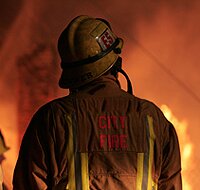|
 FIREFIGHTER SPECIAL FIREFIGHTER SPECIAL
Is On-The-Job Stress
Making You Fat?
by Michael Stefano
Healthy concerns or chronic stress?
Terror alerts, hurricanes warnings, infectious diseases, hazardous materials, not to mention the day-to-day stress of racing to every routine fire and emergency (while most people are running in the opposite direction). Even when we're not barreling to the scene of some disaster, we engage in endless drills, critiques and training sessions, as we artificially recreate these same heart-pounding experiences.
Today's world can be a stressful place, and as firefighters, we experience first hand what is usually just an attention-grabbing headline to the average citizen. But did you know that your body's response to any stressful stimuli could be what's making you fat?
The Flight or Fight Response
Millions of years ago, our cavemen ancestors also needed to react swiftly to any perceived threat. This Flight or Fight Response was designed to provide quick energy for five or ten minutes, enabling our forefathers to either do battle or run.
At the first sign of perceived danger, the human brain releases a substance known as, corticotropin-releasing-hormone, or CRH. CRH travels to the adrenal cortex and stimulates the release of the hormones adrenalin and cortisol.
Immediately after a perceived danger is recognized, eyesight and hearing improve, lung capacity jumps, and thinking become more focused. Blood is shunted from the internal organs for emergency use elsewhere. Heart rate and blood pressure climb, and due to increased cortisol levels, more stored fuel (fat and glucose) is mobilized for quick action.
Although a tremendous asset for firefighters in any emergency, this flight or fight response comes with a weighty price tag.
Insulin, the Fat Hormone
Production of insulin, the fat STORAGE hormone, is also dramatically increased. Insulin overrides signals from adrenalin to burn fat, and instead, encourages the body to store fat (for future use) in the abdominal region.
For a great stress-busting workout, click here.
This emergency response plan was appropriate to an era when our biggest concern was pure survival. Unfortunately, the human brain cannot distinguish between a real threat and day-to-day, ordinary stress (also known as chronic) .
Chronic Stress
As a firefighter, extremely stressful situations present themselves on an almost daily basis, but what about life's normal stress inducers? For example, as you sit in your car and stew over that wall of traffic in front of you, the argument you just had with your spouse, the bills you can't pay, your brain senses the onset of a threatening situation and sets the flight or fight response into motion.
You recognize this as nervous tension or just plain anxiety. Your heart pounds, you want to jump out of your skin, but you can't respond. All that extra fuel (in the form of fat and glucose) designed to provide emergency energy is now being mobilized for action, but goes unused and left behind, only to be re-deposited as fat. Researches theorize that this unused fuel (or fat) is generally deposited in the abdominal area because of its proximity to the liver, where it can be quickly converted.
In the face of prolonged or chronic stress, cortisol levels can remain constantly high, keeping you in a state of perpetual hunger. Elevated cortisol levels can promote weight gain due to an overabundance of insulin. Insulin resistance, which affects 25 per cent of all Americans, is also a major risk factor for Type II Diabetes and heart disease.
This stress response is hardwired into the fabric of our lives. Ask the average emergency worker if he or she gets stressed out on a regular basis, and you�ll most likely hear an emphatic, "Yes!" But if we can�t eliminate stress, how can we combat the negative effects of the flight or fight response on our bodies?
Exercise, Fat's Triple Threat
One of the most practical and effective ways to combat fat and the ravages of stress is with exercise. Exercise represents a triple threat to body fat.
First, exercise burns calories and utilizes stored body fat as fuel. Second, working out increases the amount of lean muscle mass your body must provide with fuel on a 24 hour a day basis. More muscle means less fat.
Researchers from Yale University have now clearly demonstrated a third mechanism by which exercise reduces stores of body fat, especially around the belly. They've proven that moderate to vigorous exercise, such as lifting weights, can offset all the negative effects of cortisol and insulin.
With as little as ten minutes of strenuous exercise the brain begins to produce beta-endorphins that calm you down and decrease levels of the stress hormone. Many feel that strenuous exercise actually mimics a typical caveman-like physical reaction to a threat, and is the modern-day version of an appropriate reaction to the flight or fight response.
A note of caution: Don't overdo it, especially at first. Too much exercise can actually cause additional stress and associated symptoms. Be sure to get plenty of rest. Inadequate sleep increases cortisol levels and reduces leptin, a hormone that signals fullness. Avoid dieting. High protein, low carb diets do not provide enough energy during stressful situations.
Common sense dictates that you eat right, get plenty of sleep, and exercise, but now we have another weapon in the battle of the bulge; stress management. Be sure to not ignore the signs of being overstressed, of which being over weight is just one symptom.
Early Warning Signs of Stress
· Sudden weight loss or weight gain
· Tired but can�t sleep, excessive fatigue
· Speech difficulties, impatience
· Headaches, repeated colds or flu
· Nail biting, teeth grinding
· Low or high blood sugar
· Low or high blood pressure
· High cholesterol or triglycerides
· Ulcers and gastric disturbances
· Chest pains, muscle aches
· Lower back, shoulder, neck pain
· Menstrual problems, hair loss
· Forgetfulness, withdraw from social life
FDNY captain (ret), Michael Stefano, author of the Firefighter's Workout Book. creates custom workouts for both firefighters and civilians alike.
 MICHAEL STEFANO is the creator and author of the Firefighter's Workout (Harper Collins 2000). Mr. Stefano is a health and fitness writer, contributor to eDiets, eFitness, and Firehouse.Com. Michael's articles have appeared on AOL, MSN, and Yahoo! His workouts have been featured in magazine and newspapers from around the country, as well as in numerous network and cable TV segments. He also offers an online version of his custom program, via a comprehensive 22-point fitness profile form. MICHAEL STEFANO is the creator and author of the Firefighter's Workout (Harper Collins 2000). Mr. Stefano is a health and fitness writer, contributor to eDiets, eFitness, and Firehouse.Com. Michael's articles have appeared on AOL, MSN, and Yahoo! His workouts have been featured in magazine and newspapers from around the country, as well as in numerous network and cable TV segments. He also offers an online version of his custom program, via a comprehensive 22-point fitness profile form.
"My program is a no-nonsense approach to exercise and weight loss that will not only get you fit, but will also fit into your life". -MS
BACK TO TOP OF PAGE
ALL MAJOR CREDIT CARDS ACCEPTED

BUY NOW
|